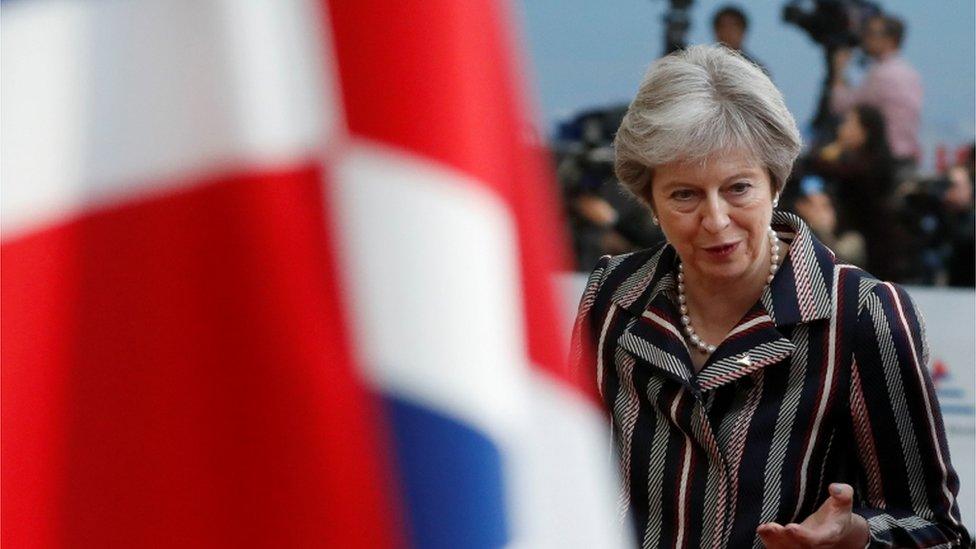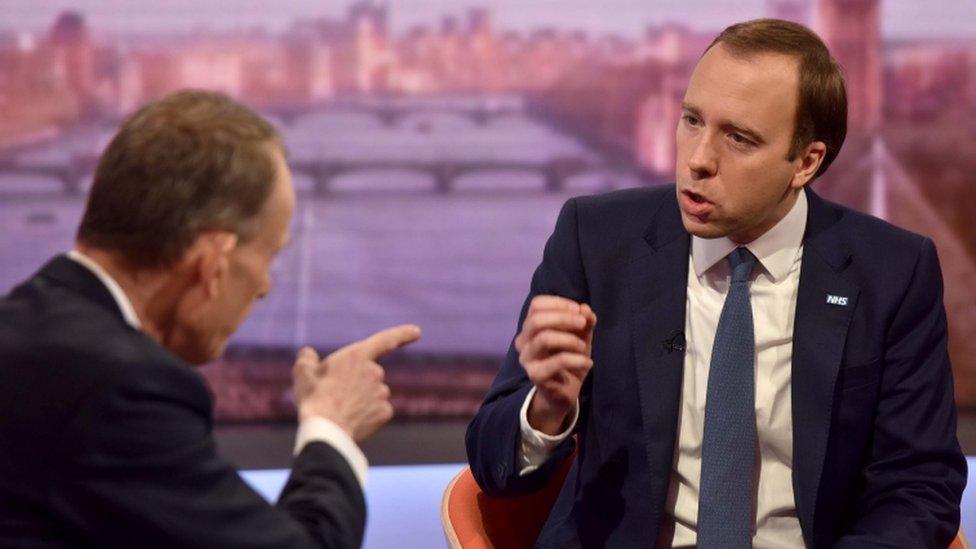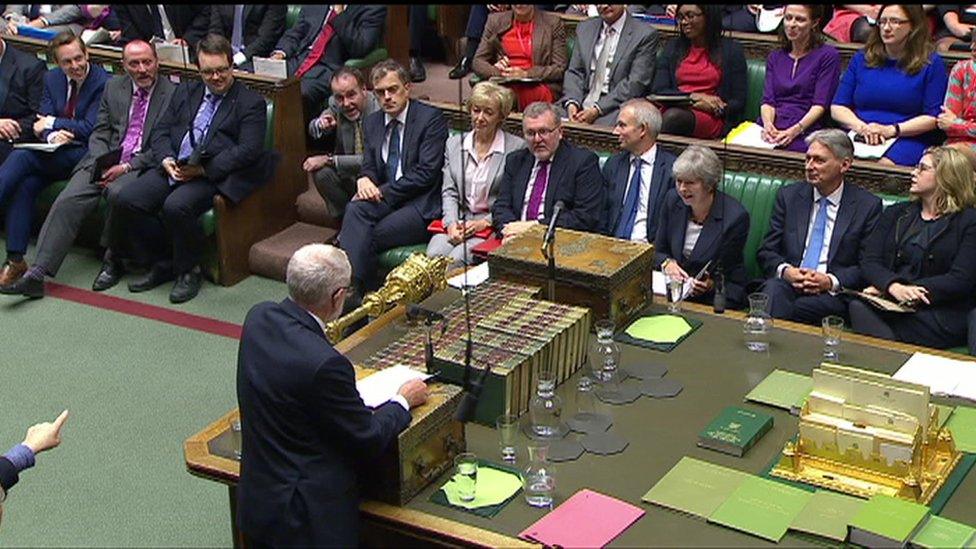Week ahead in Parliament
- Published
- comments

Westminster feels as if it's on the brink of something big - but it could be anything from a Brexit breakthrough to a Cabinet coup.
The Palace almost quivers with tension, and some of that is bound to spill out onto the floors of the Commons and the Lords, despite a week of fairly humdrum legislating.
It's also the week before the Budget, and all through the House, not a Treasury minister will be stirring, despite the ritual efforts to try and tease out some hints of what might be proposed... and this year there's another dimension, with dark hints from Tory backbenchers and others that there may be a serious attempt to derail the Budget and the ensuing Finance Bill, as a way of exerting pressure over Brexit.
And there's much action offstage.
Monday sees a meeting of the House of Commons Commission, the administrative arm of the Commons. Normally its business is unexciting admin, but this meeting will focus a response to Dame Laura Cox's blistering report on the bullying and harassment of Commons staff.
A big issue is that some of the allegations touch Mr Speaker Bercow, who normally chairs its proceedings, so will he stay away, as he did when the Cox report was commissioned? There will surely be ructions if he doesn't. And that may lead to more demands for his departure on the floor of the Commons.
Also, keep an eye on the scrutiny process for the Agriculture Bill, the first big attempt to reshape a major area of government policy for the post Brexit era.
The Environment, Food and Rural Affairs Committee is taking evidence on it, culminating with a hearing with DEFRA Secretary Michael Gove, at the end of the month. But in the meantime the Lords Delegated Powers Committee has savaged the bill, external, warning it gives excessive "Henry VIII powers" to ministers. This is clearly a generic problem with Brexit legislation; ministers are seeking to take sweeping powers, in order to be able to implement whatever deal is eventually struck....
Monday 22 October
MPs open (2.30pm) with Defence questions, and as ever the end of question time could well see the usual post weekend crop of urgent questions and ministerial statements. And keep an eye out, too for some response to the government's plans for the "meaningful vote" on the terms of Brexit; there could well be something like an attempt to trigger an emergency debate.
The main business is the remaining stages of the Offensive Weapons Bill, external, pulled last week to make room for ministerial statements (or to avoid possible defeat on some backbench amendments).
The bill aims to tackle the increase in knife and gun crimes well as acid attacks. It will strengthen police powers, and make it more difficult for young people to use acid as a weapon and to buy knives online. There are Labour amendments to create a specific crime of possession by people who are not registered firearms dealers of component parts of ammunition with the intent to manufacture,
And there are a couple of backbench Conservative amendments reflecting concern that the bill is over-restrictive on gun owners - one, from Sir Geoffrey Clifton Brown would prevent a ban on rifles over 13,600 joules at the muzzle in England - a category that covers big .50 calibre sniper's rifles; and another would introduce a requirement for higher security measures, before someone obtains a firearms certificate for such a weapon.
Another amendment, from the Conservative, Philip Davies, would mean that threatening with an offensive weapon anywhere would be an offence, not merely in a public place. There is a parallel amendment dealing with knives.
In Westminster Hall (4.30 pm), MPs debate e-petition 221033, external: Prevent avoidable deaths by making autism/learning disability training mandatory, which attracted 51,011 signatures.
The author of the petition explained: "My son Oliver was only 18 when he died in hospital on 11 Nov 2016. I believe his death could have been prevented if his doctors and nurses had received mandatory training. He had autism and a mild learning disability, and they weren't trained to understand how to make reasonable adjustments for him."

On the committee corridor look out for the Transport Committee hearing on rail timetable changes, with secretary of state, Chris Grayling; and Stephen Glaister, chair, and Ian Prosser, HM Chief Inspector of Railways and Director, Rail Safety; and Dan Brown, from the Office of Rail and Road (at 6pm).
In the Lords (2.30pm), peers debate the detail of the Crime (Overseas Production Orders) Bill, external, which is about facilitating cross-border access to data which may be significant in a criminal investigation.
Labour is likely to press a vote to prevent production orders being granted unless assurances are given that the relevant case will not result in the imposition of the death penalty.
They may also push on an amendment to protect journalists, so that notice of any application for a production order which requests confidential journalistic data would have to be given to the journalist, allowing them to make legal representations.
This will be followed by the Mental Capacity (Amendment) Bill, external, final half-day committee stage, where the key issues include the appointment of independent mental capacity advocates (IMCAs), restriction of power of attorney, advance consent and unlawful depravation of liberty.
Tuesday 23 October
MPs begin their day (11.30am) with Health and Social Care questions, after which (assuming there are no statements or urgent questions) the Labour MP Diana Johnson presents a Ten Minute Rule Bill on abortion - this picks up a similar bill presented just before last year's snap election.
The idea is to amend the law on abortion in England and Wales, and (crucially) Northern Ireland, to remove criminal liability for abortions performed with the consent of the pregnant woman up to the twenty-fourth week of pregnancy. This would replace the 150-year old Offences Against the Person Act as the basis of the law on abortion.
It would also create offences of termination of a pregnancy after its twenty-fourth week and non-consensual termination of a pregnancy, and it would create a right of conscientious objection for medical staff to participation in abortions.
The thinking behind this is that thousands of women across the UK risk prosecution by ordering pills to end their own pregnancy from online providers. Diana Johnson adds that a quarter of them report being in abusive relationships, and she points to cases like that of a woman in Northern Ireland who was prosecuted after she bought pills online for her then-15 year old daughter who was in an abusive relationship.
The day's main legislating is on the Civil Liabilities Bill, external, which deals with the treatment of whiplash injuries, and is expected to cut the cost of motor insurance premiums. It also makes technical changes to the personal injury discount rate, the method by which the courts calculate compensation payments, which could have a substantial impact on the cost of medical negligence settlements to the NHS.
The adjournment debate, led by the Conservative Giles Watling, is on elder abuse. He will be calling for elder abuse to become an aggravated offence, which would allow tougher sentences - something currently being considered as part of the Law Commission review into hate crime.
In Westminster Hall the opening debate (9.30am) will highlight complaints about a green energy firm, Home Energy and Lifestyle Management Systems.
Labour MP John Grogan will be seeking assurances on the future of parliamentary broadcasting, after the BBC dropped proposals to pare back BBC Parliament (11am); perhaps in the wake of the partial decriminalisation of cannabis in Canada, the SNP's Ronnie Cowan MP, vice-chair of the all-party parliamentary group on drugs policy reform and a supporter of drug decriminalisation, has a debate on drugs policy (2.30pm); the Conservative, David Morris, has an intriguingly titled debate on "dead man's pennies" (4pm). These turn out to be bronze plaques depicting Britannia being shadowed by a lion, given to families when one of their loved ones died in World War One. As the centenary of the end of that war approaches, he wants people who have these pennies to bring them to church on Remembrance Sunday so that the life and sacrifice of their family member can be celebrated.
Finally, (4.30pm) Labour's Shabana Mahmood leads a debate on reforming the regulation of shisha lounges. Shisha is a way of smoking tobacco through a bowl and tube or hose and shisha bars are places where people go to smoke tobacco in this way. The number in Birmingham has risen from three in 2007 to 35 in 2016 - but they are not covered by much regulation and, she says, for some communities important issues have emerged over fire safety, anti-social behaviour, noise, litter, and underage sales.

Health Secretary Matt Hancock will be answering MPs' questions at the Health Select Committee
On the committee corridor, the Health and Social Care Committee is looking at the impact of a no deal Brexit on health and social care (2pm) with Health Secretary Matt Hancock, the key witness.
The Home Affairs Committee (2.30pm) has a session on modern slavery, after a series of parliamentary events highlighting problems with the current law and support system for victims. Kevin Hyland, the former Independent Anti-Slavery Commissioner, heads the list of witnesses.
In the Lords (2.30pm) the day begins with the introduction of the Lord Bishop of Bristol, the Rt Rev Vivienne Faull. Until her appointment to Bristol was the Dean of York Minster. She'll be the fourth female bishop to sit in the Lords, and the third to benefit from the provisions of the Lords Spiritual (Women) Act 2015, which enables female diocesan bishops to take priority over their male counterparts in the queuing system for places.
As well as knowing a lot about heritage, having been Provost then Dean of Leicester and Dean of York, she takes an interest in social justice issues, modern slavery, human trafficking, and women's equality.
The main debate is on the second reading of the anti-"upskirting" measure, the Voyeurism (Offences) Bill, external. One noteable absentee will be the crossbench superlawyer, Lord Pannick, who has suggested that major changes are needed in order to make the bill effective.
Then peers debate the report from the Science and Technology Committee Life Sciences Industrial Strategy: Who's driving the bus?, external
Wednesday 24 October
MPs begin their day (11.30am) with Welsh questions, followed at noon by Prime Minister's Questions.

The day's Ten Minute Rule Bill is from the Conservative Richard Bacon. He is a long-standing campaigner on housing issues, backing moves to promote cooperative home ownership, self-build and other innovations, and this bill covers issues like thermal performance standards and providing "serviced plots" - spaces already provided with water, electricity, gas and other services, where self-build homes can be constructed.
Then MPs will be asked to rush through the Northern Ireland Executive Formation and Exercise of Functions Bill, external. This is another piece of legislation to deal with the ramifications of the continuing political deadlock which means no devolved Northern Ireland Executive can be formed. It would relax the deadline for making ministerial appointments following 2017 Assembly election and will give clarity to the Northern Ireland civil service about the decisions they can make.
In Westminster Hall debates include school funding (9.30am); asylum seekers' right to work (11am); poverty in Liverpool (2.30pm); regulation of materials used in notice boards - this is shadow environment minister David Drew, but I've no idea what it's about (4pm) and sports facilities in coalfield areas (4.30pm).
My committee pick is the Digital, Culture, Media and Sport hearing, (2.30pm) with new new Secretary of State Jeremy Wright. But there could be fun at the Procedure Committee, where Dominic Grieve, the former Attorney General, and one of the Tory rebels who extracted concessions and promises from the government on the so-called "meaningful vote" on the terms of Brexit will give evidence on how that vote should be conducted.
In the Lords (3pm), the first business is the third reading of the Non-Domestic (Nursery Grounds) Bill, external - a tidying up measure to deal with a judgment on the business rates treatment of nurseries. No votes are expected.
Report stage consideration of the Ivory Bill, external follows, with several votes expected on backbench Conservative amendments; for example, to exempt miniatures and Art Deco objects of outstandingly high artistic, cultural or historical value; and there will also be Labour attempts to strengthen the oversight of the exemptions regime; and a reverse burden of proof for those buying or selling items to show they had taken reasonable steps to determine its status.
Thursday 25 October
MPs begin (9.30am) with what may prove to be quite a charged session of Exiting the European Union questions, if the controversy about Brexit Secretary Dominic Raab's plans for the "meaningful vote" on Brexit has not subsided.
That is followed by Business questions to the Leader of the House, Andrea Leadsom, and then by two backbench debates, on folic acid fortification and the inclusive transport strategy
In Westminster Hall, the DUP's Jim Shannon leads a backbench debate on International freedom of religion or belief day 2018, highlighting the need to protect freedom of religion or belief in countries such as Iraq and Myanmar.
In the Lords (11 am), the main debates are on subjects raised by Lib Dem peers: on the case for a "People's Vote" on the outcome of the negotiations between the UK and the EU on the UK's withdrawal from the EU; and on building more affordable housing.
Friday 26 October
It's private members' bill day in both the Commons and the Lords - in the Commons, the first on the agenda is the Labour MP Karen Buck's Homes (Fitness for Human Habitation) Bill, external - which, in essence, gives tenants the right to sue their landlords to deal with the problems in unfit properties.
It arrives back in the Commons with the addition of a new "Grenfell" clause extending its provisions to cover common areas of a building, like hallways and stairs, but it would also apply to, for example, dangerous or flammable exterior cladding. The bill has government support, including for the new clause, so it is expected to clear the Commons and head off for scrutiny in the Lords.
But, as ever on a private members' bill Friday, there are tactical games to be played, and I'm told the government is less enthused about the next bill on the agenda, the Conservative former minister, Tim Loughton's Civil Partnerships, Marriages and Deaths (Registration etc.) Bill, external, which extends the right to form civil partnerships to heterosexual couples.
This may mean that the debate on Karen Buck's bill is padded out, to limit the time available to Mr Loughton.
Further down the list is the Labour ex-minister Geoffrey Robinson's Organ Donation (Deemed Consent) Bill, external - another bill with government support, that should be sent off to the Lords.
In the Lords (10am), the business of the day is a series of second readings of private members' bills from the Commons; the Health and Social Care (National Data Guardian) Bill; the Duchy of Cornwall Bill; and the Prisons (Interference with Wireless Telegraphy) Bill. Last business is the committee stage of Children Act 1989 (Amendment) (Female Genital Mutilation) Bill.
